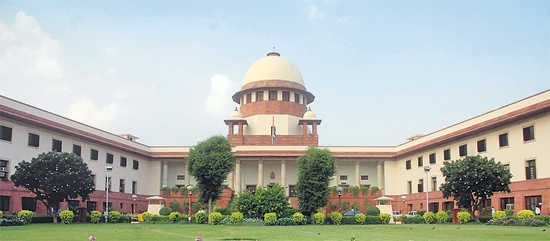The Apex court on Friday referred to a seven-judge bench the issue whether states can grant benefit of remission to convicts. It is under the Constitution by laying down a common policy and without scrutinising “facts and materials” of each case by the Governor.
Pyare Lal’s Case:
The legal issue has arisen before the Supreme Court (SC) while hearing the bail plea of a murder case convict Pyare Lal.The SC was told that Pyare Lal has been released from the jail after being granted the benefit of remission by the Haryana Governor. It was done as per a 2019 policy of the state government, under Article 161 of the Constitution.
Article 161 of the Constitution of India deals with the judicial power of the Governor to pardon a convict. Such power is also exercised by the President under Article 72 of the Constitution.
Art.161 reads of indian constitution as-
“Power of Governor to grant pardons, etc, and to suspend, remit or commute sentences in certain cases The Governor of a State shall have the power to grant pardon, reprieve, respite or remissions of punishment or to suspend, remit or commute the sentence of any person convicted of any offence against any law relating to a matter to which the executive power of the State extends.”
According to the policy, those entitled to get relief included:
- Male convicts who have been sentenced for life in a murder case and are 75 years of age and completed eight years of sentence.
- Female convicts who have been sentenced for life in a murder case and are 65 years of age and completed six years of sentence.
- The policy also included that the conduct of such prisoners has to remain satisfactory during confinement and they must not have committed any major jail offence in the last two years.
The SC noted that Pyare Lal’s case, the Haryana government had “accepted that no individual facts or material pertaining to any of the cases were placed before the Governor and that the benefit in each of the cases was conferred by the Executive itself in terms of the Policy.”
The Governor did not have the occasion to look into the issues such as severity of the crime or the manner in which the crime was committed or the impact of the crime on the Society. Also, how the matter was seen and considered by the concerned courts while holding or upholding that the concerned convicts were found guilty of the offences in question.
Relevance was sought to the case of Maru Ram vs Union of India 1980.In the mentioned case, the SC had ruled that no separate order for each individual case would be necessary for granting the benefit of remission but a general order must be clear enough to identify the group of cases.
However, the court had refused to
approve an “ omnibus” order of July 1978, issued in exercise of Art. 161 of indian constitution powers granting benefit to convicts. The decisions rendered since the Maru Ram case, shows that the relevant material (without any political vendetta or party favouritism) must be placed before the Governor in order to enable him to exercise the power under Article 161, failure on that count could result in quashing of the concerned orders of remission.
The larger bench will also look into whether the exercise of granting remission by states can override the requirements under Section 433-A of the CrPC.
Section 433-A reads as-
“Restriction on powers of remission or Commutation in certain cases. Notwithstanding anything contained in section 432 of cr.p.c. , where a sentence of imprisonment for life is imposed on conviction of a person for an offence for which death is one of the punishments provided by law or where a sentence of death imposed on a person has been commuted under section 433 into one of imprisonment for life, such person shall not be released from prison unless he had served at least fourteen years of imprisonment.”
SC referred to the powers of pardon u/a 70 &121 of the Constitution and parameters laid u/s 433-A of CrPC with the 1978 verdict of Constitution bench.
The question that arises is whether in exercise of power under Article 161 of the Constitution, a policy could be laid down setting out certain norms or postulates. On the satisfaction of which benefit been conferred upon to the convicts by the executive without even placing the individual facts and material before the Governor.





